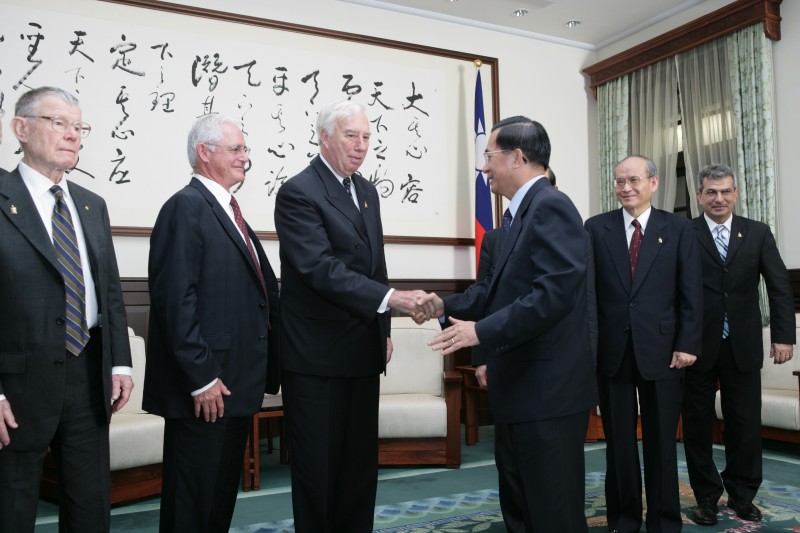President Chen Meets with Participants of the First Asia Leadership Forum

First of all, on behalf of the government and 23 million people of Taiwan, I would like to extend a sincere welcome to the foreign guests who have traveled here from afar and to Taiwan's leaders in the field of education who will be attending the first Asia Leadership Forum later today.
Co-hosted by the University of Maryland of the United States and its Taiwan Alumni Club, the forum is the first of its kind to be held by a prominent American university in Taiwan for Asian academic leaders. With a Nobel Laureate in Economics and education leaders from the US, South Korea, and Taiwan scheduled to give speeches and join panel discussions, this forum is expected to be an important educational event in Taiwan.
Being held in the year in which the University of Maryland celebrates the 150th anniversary of its founding, the Asia Leadership Forum in Taipei will create a bridge to connect future leaders from the University of Maryland and Asia. It will also lend itself, in a way that only education can, to the cultivation of talent, that precious commodity so eagerly sought after in this globalizing world.
Having "Managing Resources for a Safer World" as its theme, the forum will look into the impact of three issues -- energy, environmental protection, and disease prevention -- on Asian economies and politics. It is expected that this forum will help to determine the direction higher education should move in such that visionary Asian leaders may be cultivated for the future.
It is a privilege to have outstanding leaders in education to be the speakers and panelists at this forum, among whom are Dr. Mote, President of the University of Maryland; Dr. Gansler, Vice President for Research at the University of Maryland and former US Under Secretary of Defense; Dr. Schelling, the 2005 Nobel Laureate in Economics and a world-renowned professor of public policy and economics at the University of Maryland; and Dr. Park, President of South Korea's Pohang University of Science and Technology. Officials from Taiwan's Ministry of Education as well as the presidents of local universities are looking forward to participating in the forum, where they may exchange opinions and reach a consensus with forum participants on important issues such as how to strengthen higher education in Taiwan, accelerate efforts to help Taiwan's universities catch up with the world's leading universities, and enhance the competitiveness of this nation's talented people.
In Taiwan, most people attend institutions of higher education. The nation boasts 162 universities and 2,591 graduate schools. However, making university and higher education available to all who want it has not necessarily helped Taiwan develop elite institutions. In recent years, the performance of Taiwan's universities and institutes of higher education has somehow fallen short of expectations in rankings of the world's universities. As such, we must dedicate ourselves to developing a number of leading universities and world-class institutions, to ensure that Taiwan maintains its edge in producing talented people, for whose services the world is competing fiercely.
However, in planning to do so, criticisms have come forth from those opposed to distributing too large a proportion of the nation's limited resources to a handful of institutions of higher learning or research. And so, we are very much concerned with how to strike a balance between making higher education more readily available and developing elite institutions, and how to increase those resources dedicated to education and research. We would be very grateful if our distinguished guests would share with us your valuable opinions and advice on these matters.
The three main topics of this forum, energy, environmental protection, and disease prevention, are highly relevant to the development of Taiwan and many Asian countries. With regard to energy, Taiwan's government and related enterprises consider it important for the nation to make a comprehensive effort to develop the fledgling solar energy industry, which may turn out to be Taiwan's third trillion-dollar industry. We hope that Taiwan will become one of the world's major suppliers of solar energy products and equipment in the near future.
In the area of environmental protection, although Taiwan is not a party to the Kyoto Protocol, the nation's Executive Yuan passed a draft proposal to reduce Taiwan's greenhouse gas emissions on September 20, and the nation has been actively taking part in the Clean Development Mechanism, an arrangement under the Kyoto Protocol allowing industrialized countries having a commitment to greenhouse gas reduction to invest in projects to reduce emissions in developing countries. As to disease prevention, Taiwan has shared with many countries its experiences in fighting SARS and preventing avian flu, and seen remarkable results in helping African nations eradicate malaria and prevent the spread of AIDS.
Over the years, the University of Maryland has maintained close ties and cooperated with Taiwan's universities, think tanks, and private sector, particularly in the area of information technology. Taiwan's students consider the University of Maryland to be among their top choices of American universities, and many of the university's Taiwanese alumni have performed brilliantly in their professions in Taiwan. We hope that the University of Maryland will continue to strengthen its cooperation with universities in Taiwan and other Asian countries, in order to cultivate more talented people.
In closing, on behalf of the government and people of Taiwan, I would like to once again welcome you, and hope that you will observe for yourselves Taiwan's political, economic, social, and cultural development during your sight-seeing tour after the forum and share our joy and pride in these achievements. I wish you all health, happiness, and great success. Thank you!